Jeremy Pope and Paul Bettany talk wigs, Warhol and Basquiat, and the art of collaboration
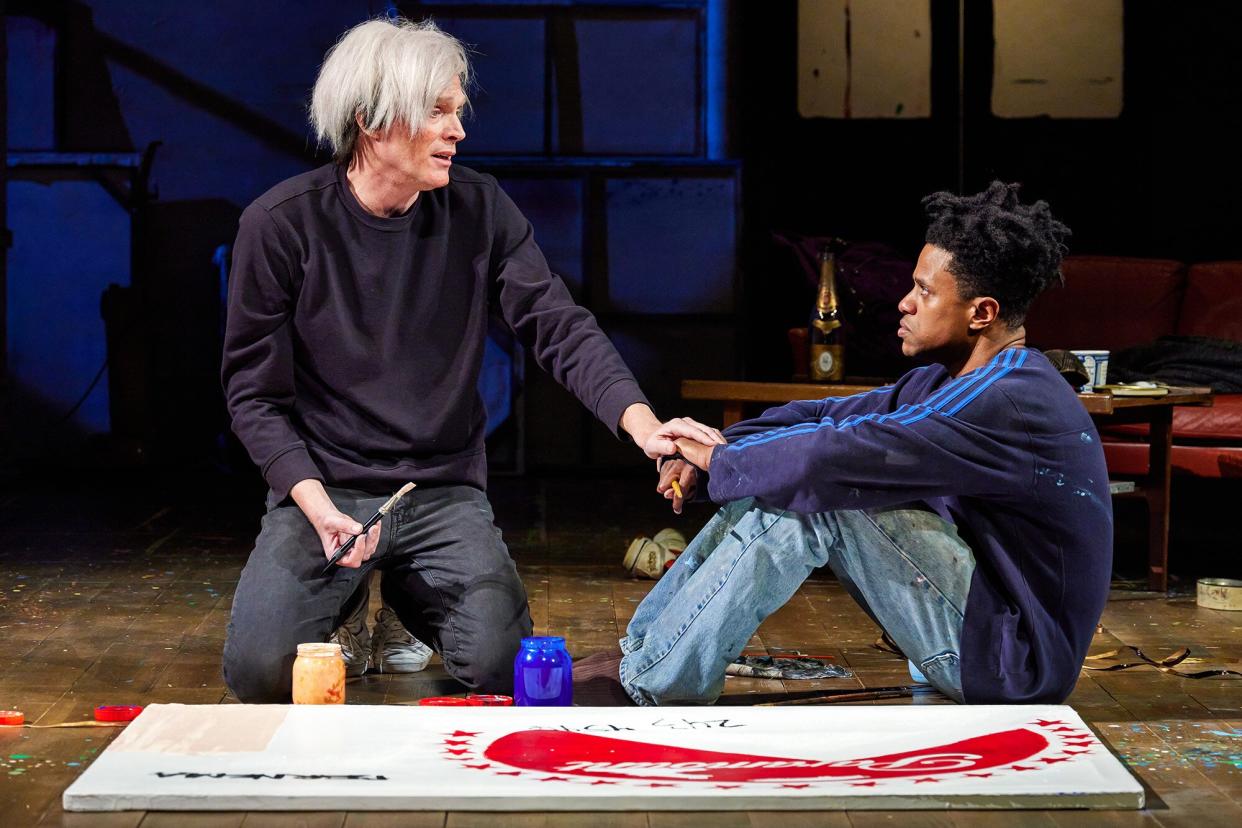
- Oops!Something went wrong.Please try again later.
- Oops!Something went wrong.Please try again later.
- Oops!Something went wrong.Please try again later.
- Oops!Something went wrong.Please try again later.
Artist to artist, what's it like doing a play that is all about two giants speaking artist to artist?
It's a meta quandary that is the elephant in the room as Jeremy Pope (Hollywood, The Inspection) and Paul Bettany (WandaVision) sit down to interview each other over Zoom just a few hours before they have to give a preview performance of The Collaboration.
The play, written by Anthony McCarten (The Theory of Everything), follows the real-life collaboration between Andy Warhol (Bettany) and Jean-Michel Basquiat (Pope), as they both face down crises of faith in their work and grapple with their standing in the art world. It began its life in London's West End at the Young Vic Theater back in February.
Since then, Bettany and Pope have also shot a movie version of the story that will release sometime in 2023, and now, they're hoping that the third time is another charm as they remount the play on Broadway at the Manhattan Theatre Club's Samuel J. Friedman Theatre.
Ahead of their Dec. 20 opening, the two actors ponder what it's like to play two artistic icons, particularly in the city that made them, how their distinctive hair and make-up helped and hindered them, and why they've stuck it out through three iterations of the story.

Jeremy Daniel
JEREMY POPE: Paul Bettany, what brought you to The Collaboration, and why did you say yes?
PAUL BETTANY: An old friend of mine, producer Denis O'Sullivan, said, "Do you want to play Andy Warhol in a play and a movie about the collaboration between Warhol and Basquiat?" And I said, "Absolutely not. I don't want to do that. Because there might be a reason that Warhol is only ever a cameo in movie, because it's so hard to get underneath the wigs and the glasses and the carefully created public persona." Then Denis sent me Warhol's diaries. I was surprised to find that they had all been dictated and he speaks in these long circuitous sentences. I thought, "Okay, maybe." I'd been a big fan of "The Collaboration" when I'd seen it remounted at the Whitney in New York and loved it. So I thought, well, what's the danger in taking part in a script workshop? And then, Jeremy, you walked in and we read through the script once and I thought, "Oh, I can see this being something special."
BETTANY: What brought you to the project, Jeremy?
POPE: I was given the script, and I had been looking for something to go back to the stage with. This felt right. The collaboration between these two icons and artists and all that they have contributed to culture — I was fascinated by that and I wanted to see if it could work. I feel very similar to you with it not being confirmed that it could be something special until I met you. It truly is a collaboration between you, our producer, Denis, and Kwame Kwei-Armah, our director. We have taken apart the script and found new ways into these souls and these giants, outside of what you can read online or in a book.
Investigating the souls and hearts of these individuals takes time. We were given time to be able to take it to London and then make a film. Now we're on Broadway and we're still discovering new things about these two individuals and the ways in which we want to tell the story. We are looking to uncover the cliches of what we know about these artists and icons and start to understand their humanity and soul. The more that we've done it, the more that I feel affirmed.
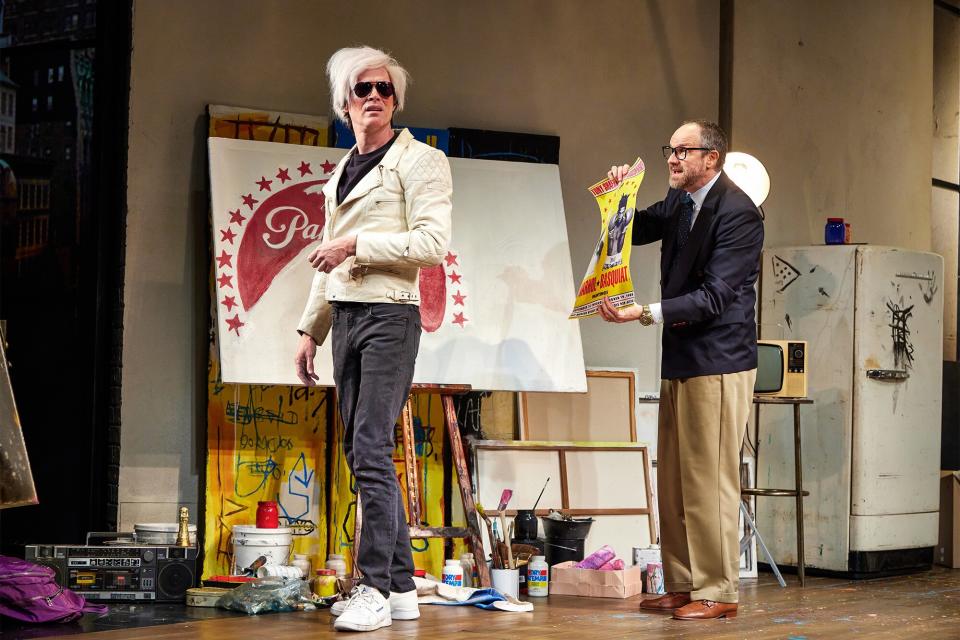
Jeremy Daniel
POPE: Was there anything that you found in the process of finding your way through what we know as Warhol that surprised you or felt interesting?
BETTANY: I can't stress enough that this is our version of Warhol and Basquiat. They are in the confines of this narrative that [playwright] Anthony McCarten has set up. What I found very useful was imagining Warhol as a young man and thinking about how terrified that particular man must have been growing up. My version was so very much afraid that he changed the entire world into seeing him as a superstar. He felt real relevancy and through that relevancy, real safety in the world. Suddenly, he is confronted in our narrative with a young man who is a challenge to all of that. He can feel his relevancy and his safety slipping away. That must have been very frightening for him. That was my in — his being drawn to Basquiat and angry at Basquiat and frightened of Basquiat and what that might mean for him.
POPE: I was fortunate to have the King Pleasures exhibit down here in New York that Basquiat's family had put on. The emphasis was less about Basquiat — this big artist and painter of all of these works — but it was him as a son, as a brother, as an uncle. It was a more intimate approach. I was able to go before we went to London. And I went nine or 10 times over the past couple of months. Any time we had a day off, I would fly to New York from shooting in Boston. His family had put so much heart and love into this space and wanted us to remember him and think of him in specific ways.
Every time I went, I challenged myself to find something new that they were giving. It was an offering that they were giving to me. I believe he had a very clear conscience from mind and heart to his canvas. I don't think there was a filter. Whatever he was thinking and vibrating with went onto the canvas. You'll see that reflected in the words that are written, political statements that are written, music artists that are represented, shapes, pictures, feelings, colors. I allowed that to help inform the decisions I make as I portray him in our story.
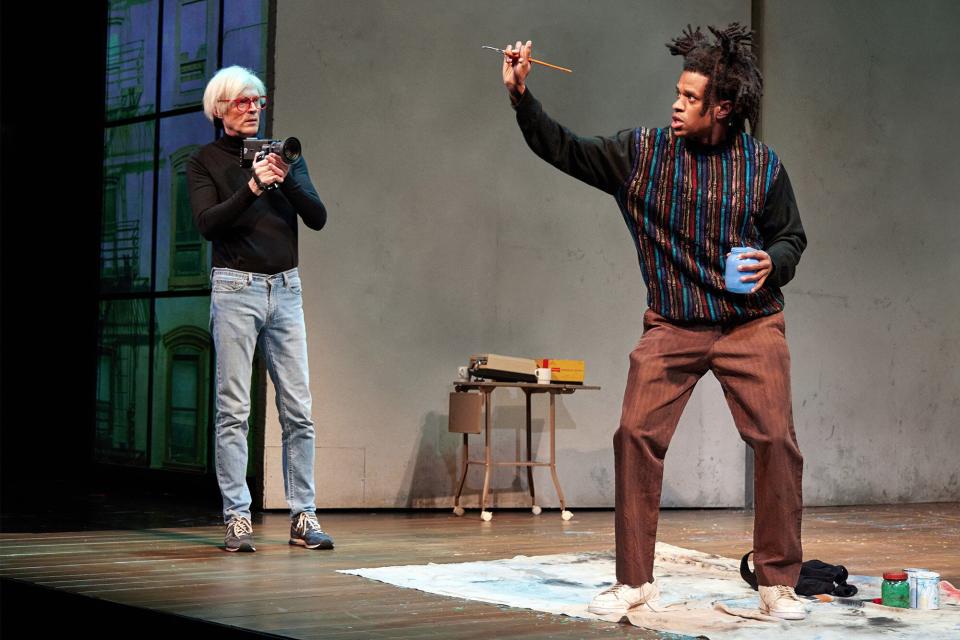
Jeremy Daniel
BETTANY: You have to paint as Basquiat, so what was that learning process like?
POPE: Yeah, we recreate some art. I'm not a painter. Or I wasn't until this point. I feel like now I can claim it. We had some people come in early on in the process to get me comfortable. Because not only do we have to say the lines, but now we're recreating art and we want to be consistent. I'm very grateful for the time that we were able to spend on understanding what it is we wanted to create and how we can recreate it every night. Almost to the point where we get on set and they would just hand me a blank canvas, and I'd be like, "I need y'all to understand I'm not Basquiat. I would love some help or guidance."
But everyone was very open to me interpreting whatever I felt. It was challenging for me because I'm a perfectionist and I want to know that I'm doing the right thing, specifically when you're portraying someone that is a genius and a giant of an artist. But it allowed me to be free in my art and my creativity and to trust that I'm right, which is very tapped into who Basquiat was. There was a freedom in the way that he approached it, so I had to lean into the over-competent version of myself in order to deliver. I do more recreating, you do more filming of me recreating.
BETTANY: Yes because we catch Warhol at a point when he feels he's done with painting. Although we do end up painting together.
POPE: And it's lovely.
POPE: We've done this in London and made the film. What's something different that you're trying or wanting to bring to the table in New York?
BETTANY: So much has changed in all three iterations. The movie changed an enormous amount. The play in New York has been very much informed by things that we learned by doing the film. But also we are bringing this story home. This feels like a natural place for this story to be told. It is a New York story about two New York legends. The pressure of that, I really felt it. But they say pressure makes diamonds. So, I've still got my fingers crossed.
POPE: We're just in previews now and we're learning a lot about our New York audiences and how they're going to respond to certain jokes. I always believe you've got to make space for the last character of your play, which is the audience. We're like, "All right, New York, tell us what you want, what you need, what you crave in this story." That line in the show where I say, "I'm from New York, Republic of Brooklyn." It's got a laugh every night, and that never got a laugh or acknowledgement in London. But it's because we're representing. We are on the stomping grounds of where these two artists rose and claimed their fame. This being the last leg of our extravaganza, it's not about what we did, but what we do. It's allowing each iteration to be different and playing and learning from that. That sense of freedom helps it not feel stale. Every night it feels like I'm recreating something new with you. Even if we just rehearsed it during the day, it feels fresh. It feels like we need to be on our toes and we need to be awake.
BETTANY: There's also the influx of new blood with Krysta Rodriguez and Erik Jensen, and Kwame is such a great host for that. He's kept an open, warm and loving, rehearsal environment. People bring their stuff, and it pushes you in new directions. We have new scenes in this play that we didn't have in London. That's also great.
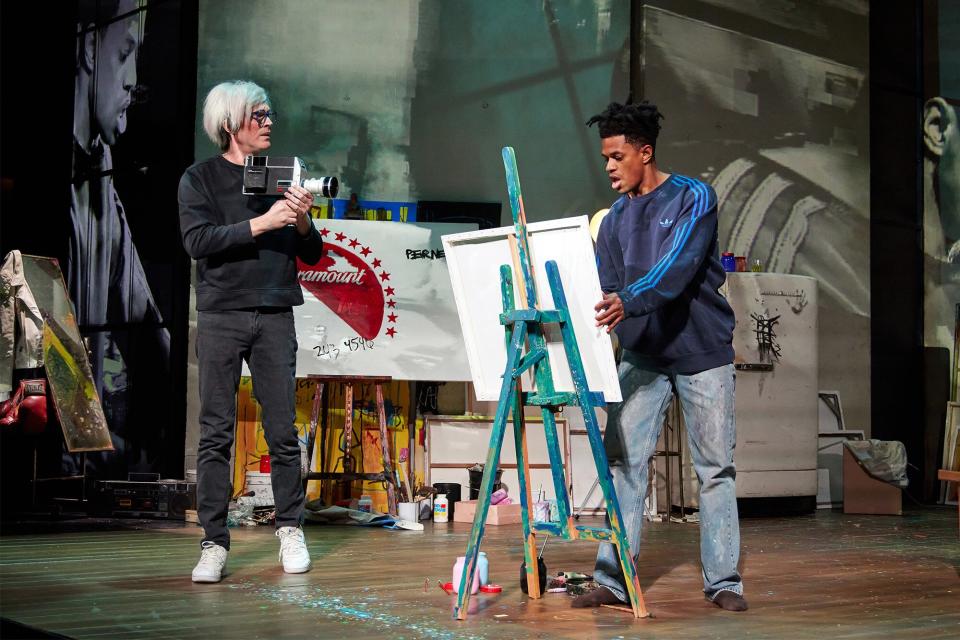
Jeremy Daniel
POPE: Paul, this is your Broadway debut. What is that like coming into this arena with so much experience under your belt?
BETTANY: I don't feel like I do. I always feel like I'm starting fresh and different things are required of me. Sometimes something will come to me easily and sometimes I'll be chipping away like a block of stone trying to find something within it. It's been 25 years since I've been on the stage, so that has been very new. I feel really blessed that I had you and Kwame supporting me through that hurdle, rebirth, renaissance, whatever it is. I haven't done theater in a quarter of a century. But as far as the Broadway debut of it, it feels really special to me. Because it is a New York story and I'm getting to tell it in New York.
BETTANY: You took Broadway by storm the last time you were there. How does this feel coming back to essentially your creative birthplace?
POPE: I feel very similar. It is a New York story, so it's so chic to bring it to New York, bring it to its people, bring it to its grounds. It's full circle because this is the same theater where I made my Broadway debut [in 2018 in Choir Boy], which feels so long ago. But it also feels like yesterday. I'm in the same dressing room with some of the same artwork that I had when I was there making my debut. But to feel grounded and confident and comfortable in the art and in the project and with you. This process has felt so safe and so freeing to try and try again, to learn and to learn again. To have had the time in London, to make the film, and then, bringing it to Broadway to New York, that could feel scary to some, but I feel at home. I feel at ease because one, I'm with you and I'm soaring. But I'm in a space that welcomes us and has welcomed me time and time again. It's life affirming. I feel like you always end up back where you started, but I feel stronger as an artist coming back.
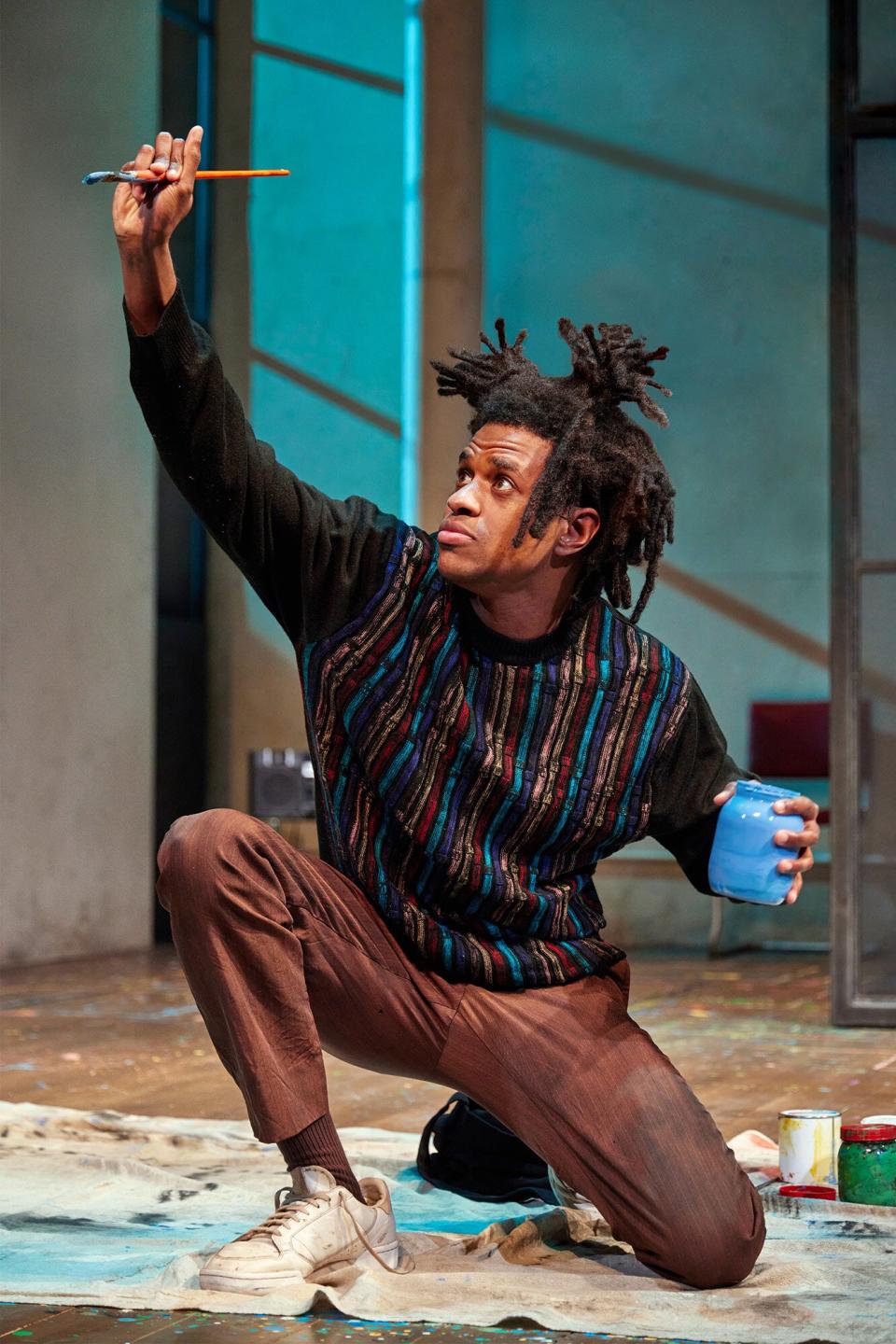
Jeremy Daniel
POPE: Paul, can you talk more about your hair and make-up and balancing that with the interal work?
BETTANY: Initially, the make-up and costume and physical life of the character was the thing that I was most daunted by because I felt like it was such a disguise for Andy. I couldn't see a way through it. But now they've become incredibly helpful. Part of the architecture of the performance is a reclaiming of all of that. He is unmasked by Basquiat, and then he reclaims all of those pieces of armor in the second act. It is a good thing to learn that initially the most frightening thing about the project became a real aid for me. He's quite an alienating person to look at. You look at him and you think, "How do I get to that person?" And the answer is, you just make it up [Laughs].
POPE: People ask us about the wigs and the hair and they're very particular styles. I told my producers that this is the one thing I'm gonna be very, very specific about is finding the right person to get this hair, the locs, because they're very specific locs. It's free locs. It's a very free, spiritual thing that people do when they grow their hair in this specific way — the attachment they have to it and what it means. It took time getting it right. I don't really think we landed on something that I was extremely confident and comfortable with until we got to the movie because we had more time. London was an experiment of us figuring out What is this show and what can it be? We then knew what our marching orders and work needed to be as far as helping visually bring the characters to the screen and the stage.
POPE: What's your favorite work of art by either of them that you've discovered through the process?
BETTANY: One of my entry points — and this is happenstance or coincidence or fate — was going to see the Basquiat-Warhol exhibition remounted at the Whitney four or five years ago. I'd actually been more drawn to Basquiat because I was quite alienated from Warhol. But then it's very difficult for somebody my age and younger to understand how much Warhol changed the way not just art looks, but how the whole world looks in terms of graphic design and everything. You look at his paintings now and they feel very familiar because they have been so influential.
POPE: In our context, we've been looking at the collaboration, the things that they did together. Their collaboration wasn't a huge success at the time. It got poor reviews, and it added this extra pressure and strain to their relationship. They didn't speak and they both passed shortly after. So, I want to honor and uplift the pieces that they did together and the time they spent together. There was a harmony. Their relationship felt very specific and nuanced, and I really believe that there was true love and admiration for one another. Each person influenced the other in a different way and with different magnitude.
BETTANY: I went to a Warhol exhibition recently, and I found it really moving, knowing what I know about Basquiat and Warhol's collaboration and how little time they both had to make art after that — to see Basquiat's influence in Warhol's solo work and vice versa. Basquiat was such a truth seeker. To see Warhol start to really embrace and investigate his own relationship with religion, for instance, in "The Last Supper," was extraordinary and some of the most vibrant work that Warhol did. And it was right at the end of his life.
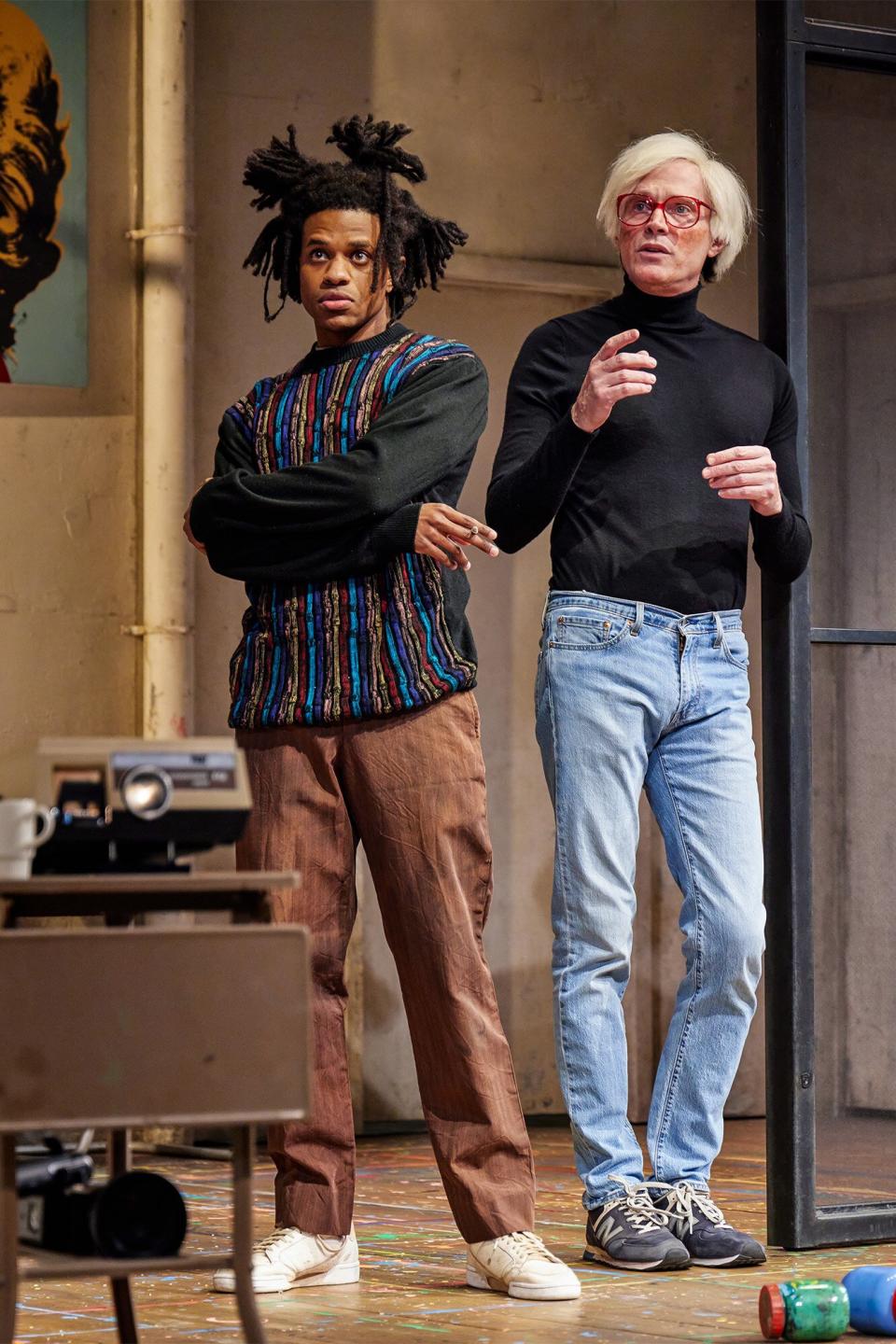
Jeremy Daniel
BETTANY: Is there something I did that helped you or inspired you throughout this?
POPE: You're one of the most loving human beings that I know. We're both being very precious with our characters. But we both came into this with no ego. The first read-through we both came in off book, and it was a sign of us wanting to be our best and over prepared. I felt like I found a partner who understands the way that I like to work. Even now with our previews, we've been using them to try new things that we've wanted to try on stage. To have a scene partner that is so loving and so willing and sees me and protects me and rides for me is really exciting.
You really need that on stage. We spend hours together all day, every day and then do a show. We've got to fall in love, fall out of love, fall back in love. Whenever I'm having a poopy day and the world is doing what it's doing and there's family stuff going on and New York's weather is tripping and all of these things that just are real life s--- — when I walk on that stage and I have my entrance and I see you, I forget all of those things. I become available for you because I know I can't do this without you and you can't do it without me.
Related content:

